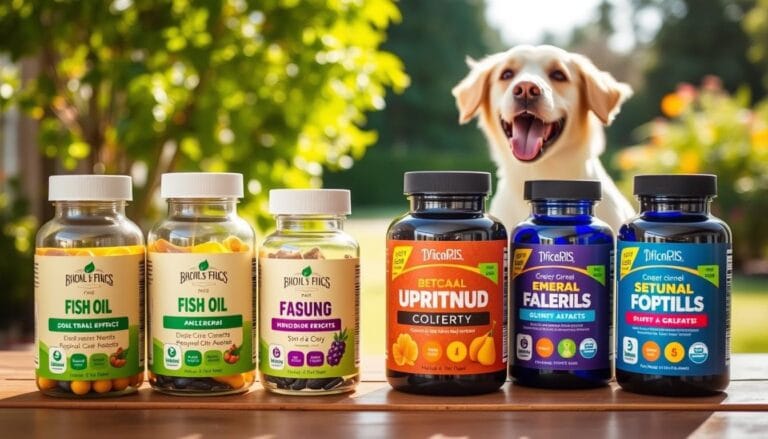As our beloved canine companions age, their nutritional needs change. Senior dogs need specific vitamins and supplements to stay healthy. It’s important for pet owners to understand geriatric canine nutrition to ensure their dogs live well in their golden years.
The aging process in dogs can cause various health issues. These problems affect organs like the kidneys, eyes, liver, muscles, and nerves. A balanced diet with essential vitamins and minerals is crucial to support these systems and reduce aging effects.
Recommended supplements for senior dogs include Vitamin B complex, Vitamin E, and Coenzyme Q-10. Also, Alpha Lipoic Acid, DMG, L-carnitine, omega fatty acids, digestive enzymes, and probiotics are beneficial. These nutrients help promote overall health and address age-related concerns. For example, glucosamine supplements can help with joint health, while milk thistle supports the liver.
Adding beneficial supplements to your senior dog’s diet can improve their appearance, mobility, and activity levels. But, it’s vital to talk to your vet before starting any new supplements. They can guide you on safety, quality, and dosage for your pet’s specific needs.
Key Takeaways
- Best Vitamins for Older Dogs.
- Senior dogs have unique nutritional requirements that differ from younger dogs
- Essential vitamins and supplements can help combat age-related health issues
- Recommended supplements include Vitamin B complex, Vitamin E, omega fatty acids, and probiotics
- Consult with your veterinarian before starting any new supplement regimen for your senior dog
- Proper senior dog nutrition can improve quality of life and minimize the effects of aging
Understanding the Nutritional Needs of Senior Dogs
As dogs get older, their diet needs change a lot. Big dogs are seniors at 5 to 8 years old. Small dogs reach senior age at 10 to 11 years. Most dogs are seniors by 7 years old.
Changes in Metabolism and Nutrient Absorption
Senior dogs digest food less well. They might have dental problems or other health issues. They also need fewer calories because they’re less active.
Studies say eating 20% to 25% fewer calories can help them live longer. But, some older dogs might need more calories and protein to stay healthy.
Importance of High-Quality Protein
Protein is vital for senior dogs to stay strong. They need high-quality, easy-to-digest protein. This helps keep their muscles and health in good shape.
While there’s debate on how much protein they need, high-quality protein is key.
“Scientific studies have shown that antioxidants, when combined with behavioral enrichment, can improve memory and cognitive function in senior dogs.”
Adjusting Fat and Calorie Intake
Senior dogs need less fat and calories. Fat is high in calories, so it’s important to watch their diet. This helps avoid obesity and related health problems.
Feeding them two or more meals a day helps control their food intake. This keeps them at a healthy weight.
When picking a dog food for your senior pet, look for foods with vitamins, antioxidants, natural prebiotic fibers, and omega-3 fatty acids. These nutrients support their health, fight off vitamin deficiencies, and help with digestion, joints, and brain function.
Key Vitamins and Minerals for Senior Dog Health
As dogs get older, their diet needs change. It’s key to give them the right vitamins and minerals for their health. Senior dog multivitamins help fill nutritional gaps in their diet.
Antioxidants: Vitamins C and E
Antioxidants are crucial for older dogs. They fight aging and boost brain health. Vitamins C and E improve memory and brain function.
These antioxidants also support the immune system and protect cells from damage.
B Vitamins for Cognitive Function and Energy
B vitamins, like vitamin B12 for older dogs, are vital. They help with brain function, energy, and cell health. Senior dog multivitamins often include B vitamins for better mood and memory.
As dogs age, they absorb nutrients less well. So, supplements become more important.
Calcium and Phosphorus for Bone Health
Strong bones are essential for older dogs. They’re more likely to get osteoarthritis and fractures. Calcium and phosphorus support bone health.
Ensuring your senior dog gets enough of these minerals helps keep their bones strong.
The pet food market, including dog supplements, is growing fast. It was worth $42.3 billion in 2021 and is expected to hit $53 billion by 2028. Pet owners are investing in their pets’ health.
By giving your senior dog the right vitamins and minerals, you can help them live a better life. They can enjoy their golden years with more energy and health.
Essential Fatty Acids for Older Dogs
As our beloved canine companions age, their nutritional needs change. Ensuring they get the right balance of essential fatty acids is key. Omega-3 fatty acids are vital for joint health, reducing inflammation, and overall well-being in older dogs.
Omega-3 fatty acids, like EPA and DHA, come from fish oil and green-lipped mussels. These nutrients offer many benefits for senior dogs. Adding omega-3 supplements to their diet can ease joint pain, reduce limping, and support healthy cell membranes.
Omega-3 Fatty Acids: EPA and DHA
EPA and DHA are essential omega-3 fatty acids for senior dogs. EPA fights inflammation, helping with joint pain and stiffness. DHA supports brain health and cognitive function as dogs age. Together, they improve the quality of life for older dogs.
When picking an omega-3 supplement for your senior dog, look for high-quality products. Platinum DHA Oil starts at $102.00. It’s a concentrated fish oil supplement rich in EPA and DHA for brain, eye, kidney, and joint health.
Benefits for Joint Health and Inflammation
Omega-3 fatty acids greatly benefit senior dogs’ joint health. As dogs age, they’re more prone to arthritis and stiffness. Omega-3s’ anti-inflammatory properties can reduce pain and improve mobility.
“Maple, our 13-year-old Boxer, has been on Platinum CJ for 5 years now. The combination of glucosamine, chondroitin, and omega-3 fatty acids has made a noticeable difference in her joint health and overall mobility.”
Omega-3 fatty acids also support healthy skin and coat in senior dogs. As dogs age, they may experience skin dryness and hair loss. Supplements like Platinum DHA Oil help keep skin moist and promote a shiny coat.
Joint Supplements for Senior Dogs
As dogs get older, their joints can become stiff and painful. This is often due to arthritis or other conditions. About 25 percent of dogs are diagnosed with arthritis, and up to 60 percent show signs of it.
Factors like breed, size, obesity, injuries, and poor nutrition can raise a dog’s risk of joint issues. If your senior dog limps, has trouble with stairs, or seems less energetic, it might be time for joint supplements.
Glucosamine and Chondroitin
Glucosamine and chondroitin sulfate are key in joint supplements for dogs. Glucosamine helps with joint function by lubricating and absorbing shock. Chondroitin sulfate keeps cartilage hydrated, preventing breakdown and pain.
These supplements are safe and often recommended for older dogs with joint disease. They have few side effects and are part of a comprehensive treatment plan.
Green-Lipped Mussel
Green-lipped mussel is a popular ingredient in joint supplements. It’s a natural anti-inflammatory, rich in omega-3 fatty acids. These acids help manage inflammation and pain in dogs.
But, it’s crucial to give the right dosage. Too much can cause problems. A fish oil supplement with green-lipped mussel can reduce inflammation in cells and joints.
MSM (Methylsulfonylmethane)
MSM is a compound with anti-inflammatory properties. It may help reduce joint pain in dogs. While more research is needed, MSM is often used in joint supplements.
“Veterinarians can provide guidance on which dietary supplements may be beneficial for older dogs with degenerative joint disease.”
Choosing the right joint supplement for your senior dog is important. Look for purity, freshness, potency, bioavailability, and sustainability. Talking to your vet can help find the best supplement for your dog’s needs.
Probiotics and Digestive Enzymes for Gut Health
As dogs get older, their digestive systems can slow down. This might cause health problems and make it hard for them to get nutrients from food. Probiotics and digestive enzymes are key in keeping the gut healthy and helping senior dogs get the most from their diet.
Probiotics are good bacteria that keep the gut balanced. They stop bad bacteria from growing, boost the immune system, and improve digestion. When picking probiotics for senior dogs, choose high-quality ones with Lactobacillus and Bifidobacterium strains.
Digestive enzymes break down food into smaller parts that are easier to digest. As dogs age, they make fewer digestive enzymes. This makes it harder for them to digest food and absorb nutrients. Giving digestive enzymes to older dogs can help them digest better and feel less discomfort.
“Routine digestive enzyme supplementation is beneficial for all pets, as it can improve digestion and assimilation of nutrients, even with processed diets.” – Dr. Jean Hofve
When picking digestive enzymes for your senior dog, look for ones with many enzymes. You want protease for proteins, amylase for carbs, and lipase for fats. Some may also have probiotics or prebiotics to help gut health even more.
Adding probiotics and digestive enzymes to your senior dog’s diet can keep their gut healthy. It also helps them absorb nutrients better and stay healthy. Always talk to your vet before starting any new supplements to make sure they’re right for your dog.
Choosing the Right Senior Dog Food with Added Supplements
As our furry friends get older, their diet needs change. It’s important to pick the right senior dog food to keep them healthy. Look for foods that offer balanced nutrition for older dogs.
High-Quality Protein Sources
Senior dogs need good protein to keep their muscles strong. Choose dog foods with real meat, poultry, or fish as the main ingredients. Vets say older dogs need over 75 grams of protein per 1,000 calories.
Balanced Vitamin and Mineral Content
A good senior dog food should have the right vitamins and minerals. Look for:
- Omega-3 fatty acids for joints, brain, and less inflammation
- Vitamin E for antioxidants and metabolism
- Vitamin C for brain health and less inflammation
- Calcium for muscles, heart, and bones
- B Vitamins for energy, brain, skin, and coat
Inclusion of Beneficial Supplements
Some senior dog foods have extra supplements. Glucosamine and chondroitin help with joints. Prebiotics and probiotics are good for digestion. MCT oils are new and help the brain.
Talking to your vet is key when picking the best food and supplements for your dog. They can give advice based on your dog’s health.
Every senior dog is different. Their diet needs depend on breed, size, activity, and health. By choosing the right senior dog food, your dog can stay happy and healthy for years.
Multivitamin Supplements for Older Dogs
As our beloved dogs age, their nutritional needs change. It’s crucial to ensure they get the right vitamins and minerals. Multivitamin supplements for senior dogs can help keep them healthy and happy.
Multivitamin Supplements for Comprehensive Support
Senior dog multivitamins, like Canine Plus™ Senior Multivitamin, offer over 25 nutrients. They support your older dog’s health in many ways. These supplements include:
- Essential amino acids like Arginine for immune health
- Antioxidants such as Vitamins A, C, and E to combat oxidative stress
- B vitamins for cognitive function and mood support
- Omega-3 and Omega-6 fatty acids from fish oil for skin, brain, eye health, kidney function, and joint comfort
Start supplementing with a senior multivitamin when dogs are 7 years old for medium to large breeds. For smaller breeds, start at 10 years. Always follow the feeding directions based on your dog’s weight.
Targeted Supplements for Specific Health Concerns
There are also supplements for specific health issues in older dogs. For example:
- Joint supplements with Glucosamine, Chondroitin, and MSM for joint health
- Cognitive support supplements with antioxidants and Ginkgo Biloba for brain health
- Digestive supplements with probiotics and enzymes for gut health
When picking supplements for your senior dog, think about their needs and health conditions. Talk to your vet to find the best supplements for your dog.
By giving your senior dog the right multivitamins and supplements, you can help them stay healthy and enjoy their golden years.
Conclusion
As dogs get older, their diet needs change. Giving them the right supplements can help keep them healthy. Senior dogs often need less food to avoid getting too fat and to ease joint pain.
Supplements like glucosamine, chondroitin, omega-3 fatty acids, and antioxidants are very helpful. They can make joints work better, improve brain health, and boost overall well-being.
Probiotics can help with digestion problems. Multivitamins can strengthen the immune system, keep the skin and coat healthy, and support the brain. It’s key to pick supplements based on your dog’s age, size, and health.
A study in 2010 by Roush, J., et al. showed that fish oil omega-3 fatty acids can help dogs with arthritis. They found it improved how well dogs could bear weight in the short term.
It’s vital to take your senior dog to the vet regularly. This helps keep track of their health and what they need nutritionally. A balanced diet and the right supplements can help your dog stay healthy and happy in their golden years.






















